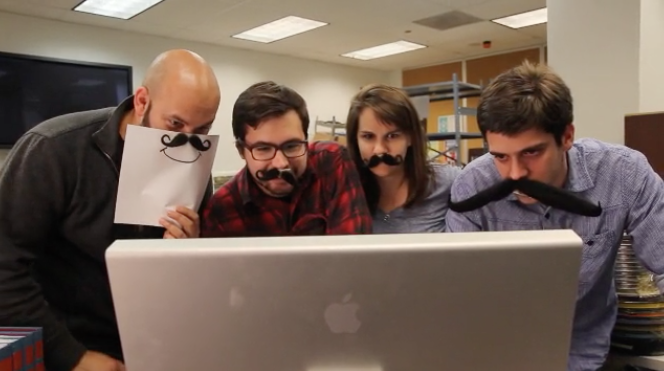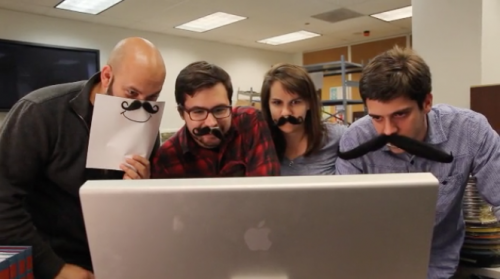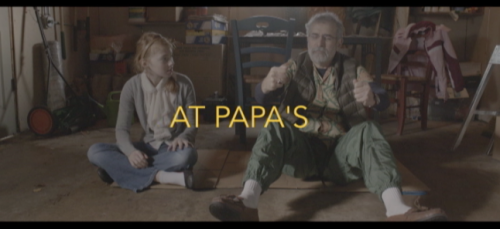
Filmmakers: Masters of All Trades

My team for the film Use Your Oui Oui prepares for a Skype call with our production designer located in “France.”
This summer has definitely involved a lot of reminiscing over the whirlwind two years that graduate school has been at Columbia. As I head out into the world with the intent of making new projects happen, I have quickly come to find that simply put—filmmakers need to be masters of all trades.
Let’s be honest, the job market out there isn’t pretty. Not only is it a challenge to pay off those tens of thousands in loans that you now owe, it doesn’t make it easier when there are few available jobs to begin with. Positions are highly competitive and in order to lock one down, you have to stand out among thousands and even if you do lock something down, a good 50% of the opportunities are unpaid.
It’s not enough to go to school, work on one concentration, and excel in your studies in order to be hired. The truth is that you have to be a master of all trades to even be marketable in the first place. You have to sell yourself, your experience, even your education, and beyond that—showcase every other amazing talent and experience that you have in between it all. You have to be a master.
Filmmakers need to be masters of all trades in order to produce films.
Even to the core of the field itself, filmmakers need to have a strong familiarity with every part of the process in filmmaking. You’re sorely mistaken if you want to be a producer but think you don’t have to know anything about business plans, financing and investors, script development, directing, line producing, casting, cinematography, production design, sound design, editing, composition, delivery, marketing, distribution, film festivals and markets, media trends, insurance, payroll, and more.
This is true of directors, producers, screenwriters, and just about everyone who wants to set out to make their own independent film. The thing is, filmmaking is a business just as much as it is an art form. Especially for folks that are just starting off, it’s best to get familiar with every aspect that you can. This will enable you to understand each piece, hire the right people, and know how to budget and schedule appropriately. And when things don’t go as planned (trust me… they rarely do…), you need to be able to STEP UP and take control. Sometimes this means creating solutions to problems quickly or sometimes it can even mean taking on a job that isn’t yours in the first place.
One of my first major productions at Columbia was Fire Escape and our production designer deserted us starting the first day of principal photography. Is he late? Is he lost? Is he okay? The answers to these questions came later but at the time, the production couldn’t be halted. There was no one else there to step in and so the job fell on my shoulders. Was I prepared to be the production designer of our film on top of being the producer? No. Not at all. But the job needed done and so the only choice was to do my best to make it happen and bring it together for my team.

Now, am I ever going to forgive myself for that stack of coffee filters? Meh, what can I say? I had no idea what I was doing.
Even more important is mastering how to work with and collaborate with all of these people. As a filmmaker, you will run into all kinds of personalities and being able to work well with those people will determine how effective your films are and whether you’ll be successful making films in the future. On one project you may have a lot of difficult personalities to work with, how are you going to manage those people and any conflicts that arise? On another project, you may have a great team but you need to manage how quickly and efficiently they work. This may sound like an obvious thing to say but the task can be a lot trickier than it sounds and may be different with every project.
Filmmakers need to be masters of all trades in order to network and get jobs.
With every position you apply to, it is smart to have a fresh resume/CV and cover letter that you have specifically prepared for each unique application. Even if you’re trying to break into the business through assistant positions, then each application needs individual attention. Your application should reveal that you are capable and experienced at a multitude of tasks. How do you stand out?
The way you sell yourself will likely determine how successful or not you will be with landing a job and building a network. Who are the people that you will reach out to and connect with? Why will they want to connect with you? Why will they want to invest in your project? More importantly, what avenues will you take to network and how do each of those avenues work within themselves? An example of this is social media and it’s growing popularity with filmmakers. It is all a game and it boils down to being a master of selling yourself and your work.

